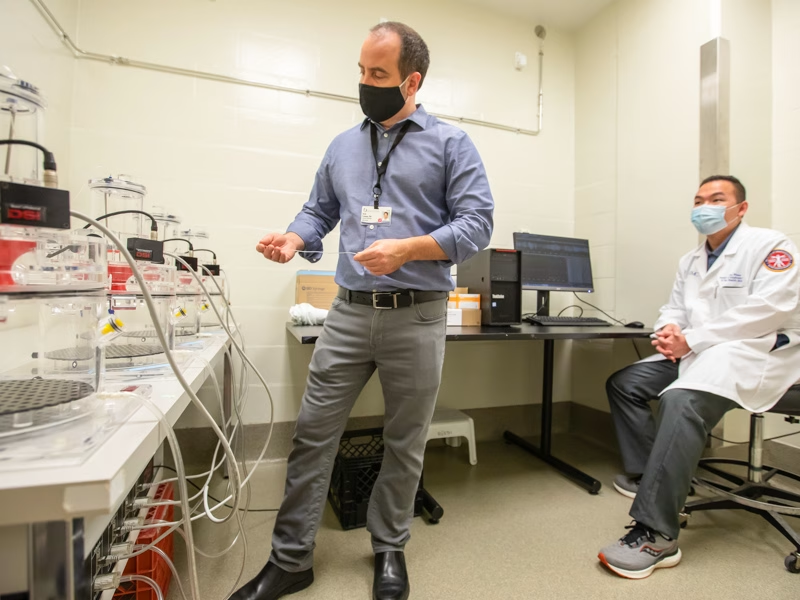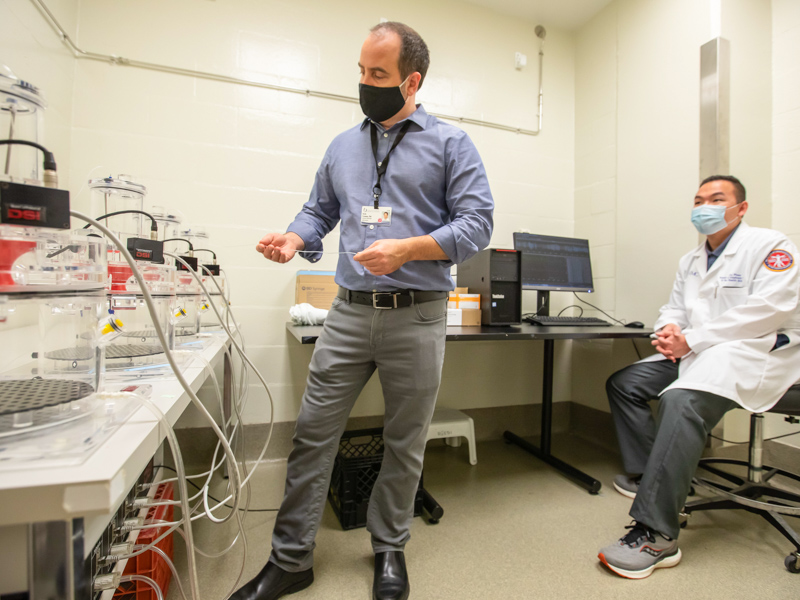Featured
Center Brings Together Education, Research, Clinical Care to Fight Addiction
It’s one more sobering pandemic fact: The Centers for Disease Control and Prevention estimates that more than 100,000 people died of a drug overdose in the United States from May 2020 to April 2021.

By Ruth Cummins
UMMC Communications

It’s one more sobering pandemic fact: The Centers for Disease Control and Prevention estimates that more than 100,000 people died of a drug overdose in the United States from May 2020 to April 2021.
It marked the first time the nation surpassed that many drug overdose deaths in a single year. The CDC says about 64 percent involved synthetic opioids, which include illicitly manufactured fentanyl. At the same time, alcohol use in this country has worsened since the pandemic began, the National Institutes of Health says.
Substance abuse is a threat to both physical and mental health, but help is available at the University of Mississippi Medical Center, where a new initiative brings together research, education and health care to find ways to offer life-changing treatments for patients struggling with addictions.
The new Center for Innovation and Discovery in Addictions, or CIDA, takes “a comprehensive approach to addictive disorders – an approach that isn’t limited to clinical services, or to training or research,” said Dr. Jefferson Parker, professor and division director of Psychology in the Medical Center’s Department of Psychiatry and Human Behavior. “Our vision for CIDA is to focus on the entire span, from basic research to clinical services to patients and families.”
Scientists and providers at the state’s only academic medical center care for those patients based on what science and their own research tells them will produce the best outcomes. That “evidence-based care” goes hand-in-hand with UMMC’s three missions: education, research and health care.
Through CIDA, laboratory researchers, medical providers and educators are addressing all aspects of addiction science and medicine. They’re performing research that brings therapies for substance use disorders from the experimental stages to the patient and ultimately to the community.
CIDA isn’t a brick–and–mortar building, but instead is the umbrella over addictions medicine that touches many parts of the Medical Center. “Our addictions clinic at the Riverchase location is just one piece of the puzzle,” said Dr. Saurabh Bhardwaj, assistant professor of psychiatry and CIDA’s medical director, who sees patients at the Riverchase Medical Suites, 2550 Flowood Drive in Flowood.
Parker and Dr. James Rowlett, professor of psychiatry, are CIDA’s co-directors. They’re shaping the goals and vision of CIDA and how research, education and health care intersect. And, they are drawing in many academic departments – for instance, emergency medicine and obstetrics/gynecology – in addition to psychiatry.
“We’ve seen a huge increase in opioid overdose deaths, a staggering increase in the numbers,” Bhardwaj said. “And with the pandemic still going on, we don’t see this coming down any time soon.”
The danger and ease of drug overdose mean those patients often need immediate help. “We’re incorporating evidence-based treatment into our addictions clinic, and we’re making it more streamlined and accessible,” Bhardwaj said. “We’re using research from CIDA to enhance outcomes on the clinical side.
“The idea is to build multiple layers of services over time so that we can have a true multidisciplinary approach that includes providers from many disciplines.”
Bhardwaj in 2018 became the first Medical Center provider to offer medication-assisted treatment, or MAT, for opioid use disorders. Those medications include drugs that reduce cravings for opioid drugs and prevent the patients from getting high if they relapse.
UMMC’s addiction treatment also includes behavioral and cognitive-behavioral interventions delivered by psychologists Parker and Dr. Andrew Voluse, an experienced clinician who joined the Medical Center faculty in July; and predoctoral psychology interns. Those interns are assigned clinical rotations within CIDA that provide educational experiences at Riverchase.
Two of the medications Bhardwaj prescribes are naltrexone and buprenorphine/naloxone. Naltrexone works in the brain to prevent feelings of well-being, or a high, for opioid users, and it decreases the desire to take opiates. Buprenorphine, packaged with or without combination with naloxone, works to prevent cravings and withdrawal symptoms in someone who stops taking opioid drugs.
Researchers including the late Dr. Bill Woolverton and the late Dr. Scott Coffey “really laid the foundation for addiction research at UMMC,” Rowlett said. “We are standing on their shoulders. We are hiring new faculty who specialize in addiction science and medicine. We’re growing from having a very solid foundation to having a very powerful group.”
The team is looping in with clinical providers “to bring them into the research fold. Down the line, a goal is to have something that happens in the lab show up in the clinic, in a reasonable amount of time,” Rowlett said.
CIDA researchers include Rowlett and Dr. Kevin Freeman, associate professor of psychiatry. “There’s a need for basic research that Dr. Freeman and Dr. Rowlett do when they’re trying to discover and develop medications to alleviate drug use disorders,” Parker said.
On any given day, you’ll see Freeman, Rowlett and PhD students from the School of Graduate Studies in the Health Sciences finding ways to lessen or eliminate the ability of opiates to kill. Working in tandem with UMMC’s Neuro Institute, they use different approaches and models to study how respiration changes when someone is administered an opioid. Their work is critical to formulating new medications similar to naloxone, also known by the trademarked name Narcan, to rescue someone who has overdosed.
This approach also is used to determine if experimental compounds designed to block the addictive effects of opioids affect their respiration.
“When we develop deterrents for prescription opioid abuse, we need to make sure that they don’t exacerbate the respiratory problems that are already caused by opioid overdose,” Freeman said. “Testing changes in breathing parameters allows us to measure if our interventions reverse, exacerbate, or have no effect on opioid-induced respiratory depression.”
The ultimate goal is to develop analgesic alternatives to standard opioids for people in acute pain – for example, following surgery or a medical procedure – that are just as effective but don’t have the potential for addiction. “Putting safe but effective analgesics in the hands of doctors is what we need to strike a balance between the often-dueling needs of curtailing the opioid crisis and meeting the needs of patients in pain,” Freeman said.
Research eventually makes its way to providers, and CIDA is facilitating that collaboration. If not for research, programs such as Helping HAND, in UMMC’s Adult Special Care Clinic for patients living with HIV, might not bear fruit.
Helping HAND, which stands for Helping to Advance in New Directions, provides both mental health and addiction services at the Jackson Medical Mall in addition to the management of a patient’s HIV infection. “It’s an example of developing and implementing evidence-based alcohol and drug screening and intervention in a medical clinic, and it’s been wildly successful,” Parker said. “It’s about to be incorporated into our routine care in our Adult Special Care Clinic.”
Voluse is the principal investigator on Helping HAND, which is funded by the federal Substance Abuse and Mental Health Services Administration (SAMHSA).
CIDA’s education component is making a significant and timely difference in the training of future addiction medicine providers. Dr. Julie Schumacher, professor of psychiatry, is the lead faculty member over CIDA’s education and training components.
Just one example: Bhardwaj supervises the education of psychiatry residents in the addictions clinic.
“That didn’t exist before,” Parker said. “It’s wonderful. Psychiatry residents have the ability to choose elective rotations in addiction medicine. We’ve also had several residents from the Department of Preventive Medicine and visiting students from other medical centers doing month-long rotations.”
Although it’s still relatively new, CIDA and the collaborations it nurtures campus-wide already have made an impact.
“The center is one way to have more streamlined and multi-level service availability that didn’t exist before,” Bhardwaj said. “We want to make the relationships more formal and have input from different providers with different perspectives.”
“We want people to know that we are here,” Rowlett said. “The bar for the standard of care is very high. Patients and providers can reach out to us.”
To make an appointment at the addictions clinic at Riverchase, a patient’s physician can make a referral, or the patient can simply call the Department of Psychiatry and Human Behavior at (601) 984-6925. Or, send an email to addictions@umc.edu. Both of those points of contact are not for emergency care.









































